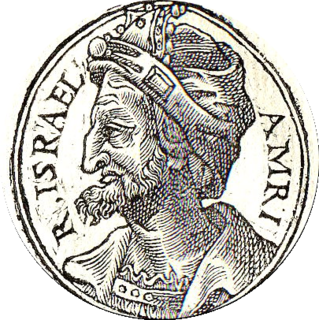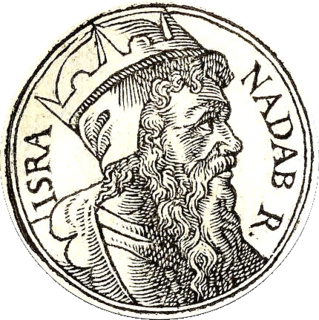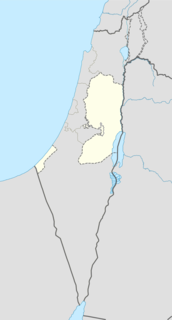
The Kingdom of Judah was an Iron Age kingdom of the Southern Levant. The Hebrew Bible depicts it as the successor to the United Monarchy, a term denoting the Kingdom of Israel under biblical kings Saul, David and Solomon and covering the territory of two historical kingdoms, Judah and Israel. However, some scholars, including Israel Finkelstein and Alexander Fantalkin, believe that the existent archaeological evidence for an extensive Kingdom of Judah before the late 8th century BCE is too weak and that the methodology used to obtain the evidence is flawed. The Tel Dan Stele shows that the kingdom, in some semblance, existed by at least the mid-9th century BCE, but it does little to show to what extent.

According to the Hebrew Bible, the Kingdom of Israel, was one of two successor states to the former United Kingdom of Israel and Judah. Historians often refer to the Kingdom of Israel as the "Northern Kingdom" or as the "Kingdom of Samaria" to differentiate it from the Southern Kingdom of Judah.

Omri was, according to the Hebrew Bible, the sixth king of Israel. He was a successful military campaigner who extended the northern kingdom of Israel. Other monarchs from the House of Omri are Ahab, Ahaziah, Joram, and Athaliah. Like his predecessor, king Zimri, who ruled for only seven days, Omri is the second king mentioned in the Bible without a statement of his tribal origin. One possibility, though unproven, is that he was of the tribe of Issachar.

Elah was the fourth king of Israel, the son and successor of Baasha. William F. Albright has dated his reign to 877 BC - 876 BC, while E. R. Thiele offers the dates 886 BCE - 885 BCE.

Baasha was the third king of the northern Israelite Kingdom of Israel. He was the son of Ahijah of the Tribe of Issachar. Baasha's story is told in 1 Kings 15:16–16:7.
Tibni was a claimant to the throne of Israel and the son of Ginath. Albright has dated his reign to 876–871 BC, while Thiele offers the dates 885–880 BC.

Asa was, according to the Hebrew Bible, the third king of the Kingdom of Judah and the fifth king of the House of David. The Hebrew Bible gives the period of his reign as 41 years. His reign is dated between 913-910 BC to 873-869 BC. He was succeeded by Jehoshaphat, his son. According to Thiele's chronology, when Asa became very ill, he made Jehoshaphat coregent. Asa died two years into the coregency.

Nadab was the second king of the northern Israelite Kingdom of Israel. He was the son and successor of Jeroboam.

Jezebel was the daughter of Ithobaal I of Tyre and the wife of Ahab, King of Israel, according to the Book of Kings of the Hebrew Bible.
The House of Gadi was a dynasty of kings of the Northern Kingdom of Israel. The dynasty is also called the House of Menahem, after its founder. The dynasty lasted for only twelve years and ruled from Israel's then-capital of Samaria. The dynasty is so named because Menahem was the son of Gadi. Some have speculated that Gadi was a scion of the tribe of Gad.
The Omrides, Omrids or House of Omri were a ruling dynasty of the Kingdom of Israel (Samaria) founded by King Omri. According to the Bible, the Omride rulers of Israel were Omri, Ahab and Ahab's sons Ahaziah and Jehoram. Ahab's daughter Athaliah also became queen regnant of the Kingdom of Judah.
Jehu son of Hanani was a prophet mentioned in the Hebrew Bible, who was active during the 9th century BC.

Zimri, was the fifth king of Israel. His reign lasted only seven days. William F. Albright has dated his reign to 876 BCE, while E. R. Thiele offers the date 885 BCE. His story is told in 1 Kings, Chapter 16.

This article is an overview of the kings of the United Kingdom of Israel as well as those of its successor states and classical period kingdoms ruled by the Hasmonean dynasty and Herodian dynasty.

Tirzah was a town in the Samarian highlands northeast of Shechem; it is generally identified with the site of Tell el-Far'ah (North), northeast of modern city of Nablus, in the immediate vicinity of the Palestinian village of Wadi al-Far'a and the Far'a refugee camp, although Conder and Kitchener suggested that the ancient city may have actually been where Tayasir is now located, based on its phonemes. Conversely, biblical researchers, Robinson and Guérin, suggested identifying the town with Talluza.
The House of Jeroboam or Jeroboam dynasty was a reigning dynasty of the Kingdom of Israel. They are depicted in the first of the Books of Kings. Their estimated reign is placed in the 10th century BCE.
The House of Baasha or Baasha dynasty was a reigning dynasty of the Kingdom of Israel. They are depicted in the first of the Books of Kings. Their estimated reign is placed in the 10th century BCE.
The House of Jehu or Jehu dynasty was a reigning dynasty of the Kingdom of Israel. They are depicted in both of the Books of Kings. Their estimated reign is placed from the 9th century to the 8th century BCE.

2 Kings 10 is the tenth chapter of the second part of the Books of Kings in the Hebrew Bible or the Second Book of Kings in the Old Testament of the Christian Bible. The book is a compilation of various annals recording the acts of the kings of Israel and Judah by a Deuteronomic compiler in the seventh century BCE, with a supplement added in the sixth century BCE. This chapter records Jehu's massacres of the sons of Ahab, the kinsmen of Ahaziah the king of Judah and the Baal worshippers linked to Jezebel. The narrative is a part of a major section 2 Kings 9:1–15:12 covering the period of Jehu's dynasty.











